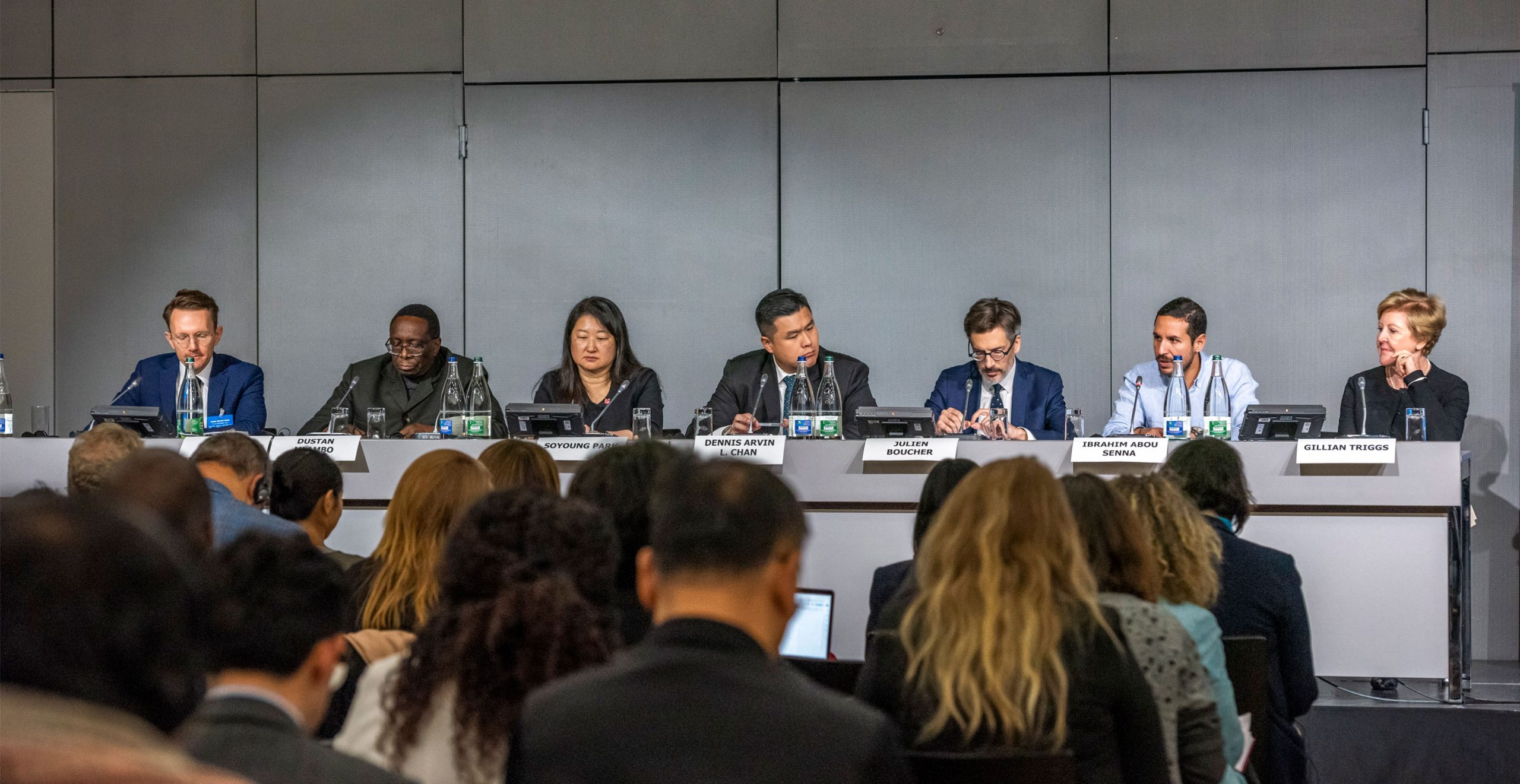
Speakers and attendees at the high-level event ‘Access to Protection: Asylum Systems, Legal Assistance, and Human Rights’, one of a series of discussions at the Global Refugee Forum 2023. ©UNHCR/Olivier Chamard
Set against the backdrop of increased forced displacement, conflicts and unprecedented challenges facing national asylum systems, the Global Refugee Forum in December 2023 emerged as a moment of great solidarity. The Forum brought together over 4,200 participants from across the world – featuring representatives from 168 State delegations, 427 other delegations representing international and civil-society organizations, over 300 representatives from the refugee community as well as academics, the private sector and media among others.
States and other stakeholders at the Forum announced over 1,600 new pledges, 1,380 of which contribute to one or more of the 43 multistakeholder pledges. A key highlight was support towards the multi-stakeholder pledge ‘Asylum Capacity – Asylum Capacity Support Group (ACSG)’, signaling a collective commitment to establish and strengthen national asylum systems, ensuring they are characterized by fairness, efficiency, adaptability and integrity. Detailed information on contributions towards this multi-stakeholder pledge can be found under the pledges tab of the ACSG portal.

Refugee representatives discuss asylum capacity at the Speakers Corner, one of a series of impactful, short talks on the key themes of the Global Compact on Refugees 2023 ©UNHCR
Multi-stakeholder engagement on asylum capacity
A total of 55 pledges have been recorded on asylum capacity. 43 pledges were made by 36 States while an additional 12 pledges were made by 11 other stakeholders.
Asylum capacity pledges by States were recorded from the following regions, which is broken down as the Americas (18), followed by Asia-Pacific (six), Europe (six), West and Central Africa (four), Southern Africa (four), the East and Horn of & Great Lakes region (four) and Middle East and North Africa (one).
States committed to a range of priorities including legislative reforms, enhancing registration and data systems, addressing backlogs, strengthening capacity through training, simplifying procedures, activating appeal processes, and refining border referral and screening mechanisms among others.
Pledges by other stakeholders including civil society organizations, international organizations, academic and research institutions, and the judiciary focused on legal aid provision, promoting inclusive participation, advancing training and research initiatives, as well as asylum capacity development efforts.
UNHCR will rely on these pledges and commitments, including those pledges made before the GRF 2023 which remain active, to identify support for asylum capacity projects and initiatives including with pre-matched entities, explore new matches and partnerships based on available needs and support the exchange of experiences and good practices on key asylum issues.
Global and regional pledges
It is encouraging to see the various commitments made towards strengthening national asylum systems, with some focusing on specific regions, others targeting individual States within a region, and some having a broader global scope. These pledges focus on harmonizing refugee laws and policies, as well as enhancing asylum capacity of host countries and partners including those along key migratory routes.
The Comprehensive Regional Protection and Solutions Framework (MIRPS) support platform developed regional pledges toward strengthening asylum systems in Central America and Mexico while the East African Community (EAC) pledged to advance the adoption of EAC Regional Refugee Management Policies in the East and Horn of Africa and Great Lakes region.
In addition, the European Union made a pledge to support the efforts of Ukraine and Georgia to align their asylum and reception systems; provide high-quality asylum space in the EU and continue to support the Regional Development and Protection Programme Phase VI to partner countries in North Africa and across the Atlantic.
Australia and New Zealand indicated their support to enhance asylum capacity in small and emerging states within the Asia-and the Pacific region. Canada committed to continue supporting asylum system strengthening projects in Mexico and expressed willingness to explore similar initiatives in Central America including through the MIRPS support platform. Additional support pledges towards States were made by Denmark, France, Georgia, Sweden and Switzerland.
Policy pledges by States to implement specific projects or activities in support of national asylum systems were made by Belize, Botswana, Brazil, Burkina Faso, Chile, Democratic Republic of the Congo, Ecuador, El Salvador, Eswatini, Ethiopia, Gambia, Guinea, Guinea-Bissau, Honduras, Kazakhstan, Kyrgyzstan, Lithuania, Panama, Paraguay, Peru, Philippines, South Sudan, Somalia, Thailand, and Uganda. The policy pledges from Chad, Georgia and Mexico specifically indicated their request for support which was addressed through pre-matching with France, Switzerland and Canada respectively.
Among other stakeholders, the International Association of Refugee and Migration Judges – Africa Chapter pledged to provide capacity support to judges, magistrates, government and legal professionals as well as support States with backlogs and development of regional asylum policies.
The Legal Community Pledge by PILnet on behalf of its members includes a subsection on asylum capacity development among other issues such as increasing refugees’ access to legal services and information.
Looking ahead
As indicated in the summary of the Global Refugee Forum 2023 by the co-hosts and co-convenors, the Global Refugee Forum served as a moment of global unity. It provided an opportunity for States and various stakeholders to exchange experiences, highlight challenges and opportunities, and make concrete commitments toward strengthening asylum capacity, demonstrating a collective determination to stand in solidarity with world’s refugees.
As States and all stakeholders begin translating their commitments into concrete actions, there is potential to build fair, efficient, adaptable asylum systems that have integrity which is so vital to achieving the objectives of the Global Compact on Refugees.

Recent Comments